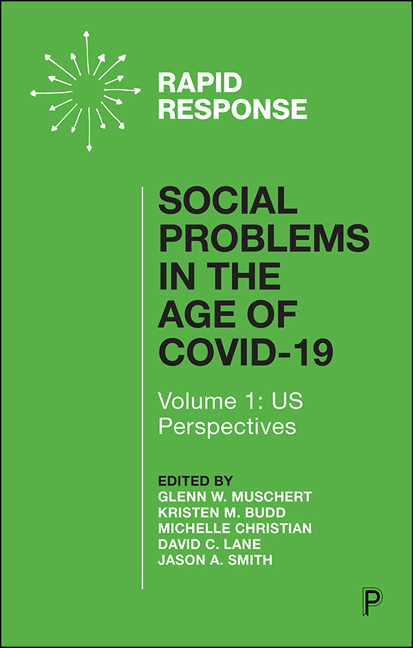Afterword
Published online by Cambridge University Press: 23 March 2021
Summary
This volume provides the public at large, scholars, students, and policy-makers with sociological analyses of the impact of the COVID-19 pandemic on a series of significant social problems. For the individual, nothing rises to the level of losing a loved one. The pandemic, however, has done more than wreak havoc on the lives of millions of people—disproportionately people of color and the poor. Consequently, COVID-19 has reminded us of the deep and persistent underlying societal inequities that explain the disparate impact of this pandemic on different groups. Viruses do not discriminate, but we do. The chapters in this volume speak eloquently to this disparate impact and provide us with a deeper understanding of the changes required to avert similar, if not more devastating, consequences in the future. Meanwhile, the politically calculated response by elected officials to the pandemic calls into question whether it is enough to provide solutions based on rigorous scientific analyses. Politics, not science, tends to win when the two are pitted against one another—and that, clearly, has implications for the work we do, how we do it, and for whom we do it. While problems often require short-term responses to address the immediate suffering of millions, and they are prescribed in these chapters, long-term solutions to these problems require fundamental social structural changes, addressed as well, either explicitly or implicitly, in this volume.
The Agenda for Social Justice volumes and this latest title on COVID-19 were conceived to target a different, broader audience than sociologists typically target, with analyses of social problems. But is it enough? Are there other, even more effective ways to reach even broader audiences, effect change, and become more relevant in the public arena of policy debates? The Society for the Study of Social Problems (SSSP) identifies itself as a social justice organization, but continues to grapple with what that means in practice. Should we, and indeed can we, as professional sociologists, play a more active role in bringing about the fundamental social change prescribed, if not demanded, by the type of analyses in this volume? Every year, for example, the SSSP gives $5,000 to a social justice organization in our annual meeting host city.
- Type
- Chapter
- Information
- Social Problems in the Age of COVID-19 Vol 1Volume 1: US Perspectives, pp. 143 - 150Publisher: Bristol University PressPrint publication year: 2020

